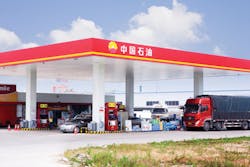Contango opportunities
TRADING COMPANIES SHOULD NOTE THE CYCLICAL NATURE OF THE PETROLEUM INDUSTRY
MAHIN KHALID SIDDIQUI, GULF INTELLIGENCE, DUBAI
THE ENERGY era has brought challenges and opportunities to the global oil and gas industry. For all stakeholders in the energy chain, this remains a critical and uncertain time, and adaptability has become vital.
As the US shale boom shows resilience and OPEC keeps its spigots at full flow, oil prices have halved to reach the $50 glass ceiling. At the same time, oil supplies from the North Sea and West Africa have reached their peak from the last three years, while Russian nonchalance over a low price environment continues. Add to this the historic deal between Iran and the super powers concluded in June 2015 that is expected to add another two million barrels of crude to an overflowing energy market once sanctions are fully lifted.
On the demand side, many worry about China. As the locus of world oil demand, a further oil spread is foreseen as Beijing slows down to 2% growth per year, according to the Wall Street Journal. As a consequence, August crude stocks climbed to about 2.7 million barrels, and Goldman Sachs estimates that crude supply will outstrip demand by two million barrels a day, warning of increasing pressure on global storage capacity. As winter approaches, refiners will have few options to find additional storage space for millions of barrels of oil flooding the global energy market.
For oil producers, these are tough times. But for traders, crude surplus provides them an opportunity to exploit contango - a time when the price of a commodity in the present time is less than the price in the future.
In a cyclical industry, a contango market was previously witnessed in 2008 during the global recession as the dramatic economic downturn corresponded with a drop in oil prices. By the end of 2008, crude oil inventories reached a record high as oil fell to less than $38 per barrel and the difference between long term and short term maintained the widest gap ever witnessed.
While the super-contango of 2008 is not seen in today's market, it is still true that many other contango opportunities have emerged. In an interview in August, Vitol CEO Ian Taylor, who heads up the largest independent energy trading group, said there is mounting evidence of a futures market growing globally.
Traders with access to physical onshore storage are keen to exploit the opportunity. According to Bloomberg News, the Caribbean island of St. Lucia and Africa's Saldanha Bay are on the receiving end of oil bounty that provides substantial profits to pro-active companies. Vitol has sent Nigerian crude to an onshore facility on Saldanha Bay on August 25 while rival Glencore, not to be outdone, sent a medium-sized Everglade tanker full of North Sea crude to St. Lucia on September 9.
In the Middle East, around the same time last year, many worried about empty tanks and hollow storage vessels. Today the United Arab Emirates are undergoing aggressive expansion as traders with access to physical oil storage scramble to profit from the great 2015 oil glut.
Vopak Horizon Fujairah - wholly owned by Emirates National Oil Company (ENOC) - has announced the seventh phase of an expansion plan that will see five new storage tanks installed for crude oil, with completion scheduled for the summer of 2016. Sharjah-based Gulf Petrochem has plans to spend $80 million, divided between Fujairah and East Africa.
While expanding to exploit a contango opportunity in an era of low oil prices and high profits may be a smart business move, energy trading companies should take note of the cyclical nature of the petroleum industry. As storage tanks fill up and profits pour in, this is an ideal time for storage operators and trading companies with physical infrastructure to diversify cost effectively and aim to maintain a more diverse portfolio. Business models launched in times of steep oil prices can be revamped in an era of prolonged low prices to sustain the next price super cycle.
For some companies this could mean diversifying and modifying infrastructure to cater to more oil products. Market conditions in 2008 quickly turned into a backwardation market by 2011 - the opposite of contango where traders had empty stockpiles. However, diversification should be rational. For the Middle East's Fujairah, it could mean continuing to build crude storage. However, other operators in the North might be well advised to cater to chemicals storage, and even expanding into the waste and recycling storage market.
A key investment opportunity for trading companies could be to supervise construction of flexible storage facilities. Facilities with the necessary infrastructure for storing and blending fuels will be regarded as more efficient and hence attract greater profits. More daring storage operators can take this a step further and create infrastructure for green fuels to ensure relevance in the sustainable energy sector. A typical lesson learned in this industry is to diversify one's business or die.
Lastly, trading companies need to ensure that any expansion plans come at a cost effective and efficient location. For example, the East Coast of England remains an ideal location for inland distribution of fuels through strategically developed transport links, while the Rhine River in Germany remains a strategic location in the heart of Europe with access to the major international ports at Antwerp, Rotterdam, and Amsterdam. Certain locations on the Baltic Sea also provide opportunities to play contango for a diverse range of products, including jet fuels, diesel, and fuel oils.
In the Middle East, Fujairah is the only UAE emirate situated outside the prone-to-conflict Strait of Hormuz on the Arabian Sea. While neighboring Oman is gearing up to introduce Duqm's crude park, Fujairah's strategic location gives it a distinct geographical advantage for trading companies with well-developed infrastructure.
While this is obviously a hallelujah time for the trading community, expensive investments in the post-easy oil era should be made with caution. In these uncertain times, trading companies and storage operators that are looking to invest in infrastructure would do well to consider key locations with diverse portfolios if they want to survive and thrive in a distinctively Darwinian oil and gas industry.
ABOUT THE AUTHOR
Mahin Siddiqui is an associate at Gulf Intelligence in Dubai. She is an energy analyst and communications professional with a background in upstream oil and gas consulting and has experience in conventional energy analysis, including holistic trends identification, geopolitical analysis, and risk analysis of upstream businesses in the MENASA region. Opinions expressed here are strictly her own and not those of Gulf Intelligence or any other group.


